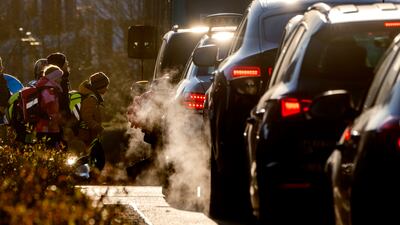The European Commission — the bloc’s executive arm — has offered reassurances to Germany that it will exempt cars that run on e-fuels when the EU phases out new combustion engine cars in 2035, in a plan that it hopes will be adopted on Tuesday during a meeting of energy ministers in Brussels.
A European Commission spokesman said on Monday that officials would present the details of a deal struck on Saturday with Germany during a meeting of EU ambassadors, but declined to make them public until the bloc’s energy ministers reach an agreement.
“We are explaining to Member State Ambassadors today the statement we intend to issue after the vote, which we hope will take place tomorrow at the Energy Council,” the commission’s climate action and energy spokesman Tim McPhie told The National.
Germany and the EU Commission on Saturday announced that they had reached a deal on the future use of e-fuels in cars. For weeks, Berlin had blocked the EU’s plans to ban sales of new CO2-emitting cars in 2035, demanding an exemption for combustion engine cars that run on e-fuels.
The Swedish Presidency of the EU confirmed that the CO2 legislation would be on the agenda on Tuesday.
According to several media reports, the commission is working in parallel to satisfy Germany by creating a new EU vehicle category for cars that can only run on carbon-neutral fuels, and then present another regulation specifying how these cars can contribute to the 2035 target.
News website Politico reported on Monday that Germany demanded binding legal language that would ensure that this separate regulation would be adopted even if the European Parliament or courts tried to block it.
Mr McPhie made no comment on such details.
E-fuels are made using captured CO2 emissions and low-carbon hydrogen. Such fuels are not yet produced at scale, but are seen by some carmakers as a route to prolong the use of combustion engines.
Germany's demand was supported by parts of the country's car industry.
The exemption was criticised by climate campaigners.
“E-fuels are an expensive and massively inefficient diversion from the transformation to electric facing Europe's carmakers,” said Julia Poliscanova, a senior director at campaign group Transport & Environment.
Berlin's last-minute opposition came even though EU countries and the European Parliament last year agreed a deal on the law to phase out combustion engines.
Some EU politicians said Germany’s move could embolden governments to block other carefully negotiated deals on climate policies.
“The entire architecture of decision making would fall apart if we all did that,” Latvian Prime Minister Krisjanis Karins said last week.


